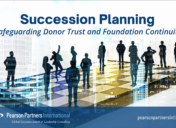Five Insights for CFOs to Rise to CEO

Stephen P. Konstans, a former Senior Vice President at Pearson Partners International, was featured in an Oracle NetSuite study on the increasing rise of the CFO to CEO, with insight and tips for CFOs for a successful ascent to CEO. Pearson Partners summarizes this transformative study below. Read the full article and a comprehensive breakdown on NetSuite.com.
In the first half of 2022, the promotion of chief financial officers to chief executive officers reached an all-time high, marking an upward trend over the last two decades. Today’s market uncertainties and challenges have heightened the need for business leaders with financial and analytical acuity, making the selection of the CFO as CEO even more appealing to boards and stakeholders.
Stephen P. Konstans, a former Senior Vice President at Pearson Partners International, attributes this upward trend to rising interest rates, inflation, global uncertainty and supply chain disruption. “[These factors] cause boards to be even more interested in getting somebody who can guide the ship from a financial perspective,” says Konstans.
Twenty years ago, the COO was typically the primary stepping stone to the CEO. However, the landscape is shifting. According to the 2022 Volatility Report from executive search firm Crist|Kolder Associates, 8 percent of surveyed CEOs at Fortune 500 and S&P 500 companies advanced from CFO roles, up from 5.6 percent a decade ago.
The breadth of the CFO remit and increasing responsibilities—including managing risk and compliance with ESG (environmental, social and governance) and DEI (diversity, equity and inclusion) mandates—have primed CFOs for the top leadership position. According to Konstans, CFOs have always been natural successors to CEOs because of their comprehensive involvement in company affairs. “That’s by default,” Konstans says, “because of all the things they’re brought in on in typical companies.”
5 Insights for CFOs and Finance Executives Seeking the CEO Seat:
- Internal Promotions and Organizational Culture: CEOs are more likely to be recruited from within during economic volatility, often because boards and search committees are less likely to take on the risk of hiring externally. Company culture can also influence the process, says Konstans. For example, a sales-focused company often promotes its chief revenue officer, while an engineering-oriented company may promote its chief operating officer. However, broad oversight and an expanded role make the CFO the likely choice for CEO for most businesses.
“Uncertain economic times put more emphasis on getting somebody who is a financial expert into that CEO seat.”
- Relationships with Boards and Stakeholders: A successful transition to CEO hinges on strong relationships with board members and stakeholders (both internal and external) built on trust and transparent communication. Intangible qualities like emotional intelligence, informed prioritization, problem-solving skills, effective communication and strong leadership traits are crucial for these relationships.
- Academic Credentials: While an Ivy League degree is not a prerequisite, an MBA or similar qualification increases the chances of a CFO’s promotion to CEO. While the number of CPAs has declined among CFOs over the last five years, more than half have earned an MBA. This educational pursuit showcases a CFO’s commitment to professional development, according to Konstans.
- Challenging Stereotypes: People often label CFOs as risk-averse, introverted, lacking creativity and poor managers. To effectively transition to CEO, CFOs must challenge these stereotypes by demonstrating their ability to take risks, show creativity and lead effectively.
“CFOs I’ve worked with who sought the top job are rarely driven by ego, but rather a desire to leave the company better than they found it. Typically, it’s the opportunity to build something, leave your imprint on something, feel like you’re doing something meaningful.”
- Prepared Succession: CFOs aspiring to step up to CEO should groom strong successors, making it easier for boards to consider them for promotion. Formal succession planning is vital considering that most CFO hires—72 percent, according to a Pearson Partners study spearheaded by Konstans, are recruited externally. “If you want that opportunity, you need to show that you can build, develop, mentor and have the right people in the right seats,” says Konstans.
“Good leaders get intrinsic value by putting their stamp on the organization and helping the people behind them achieve. There is a much more natural tendency among those CFOs to want to bring others along. ”
Bottom Line
With today’s market challenges, chief financial officers are increasingly ascending to chief executive officers—perhaps more so than in any other decade in recent history. CFOs and financial executives can take vital steps early in their careers to position themselves as the best candidate for the CEO seat.
Read the full article and a comprehensive breakdown of insight and tips on Oracle NetSuite.com.
Related Posts
- ← Forbes Names Pearson Partners International One of America’s Best Executive Search Firms
- Are CFOs Being Asked to Do Too Much? →















